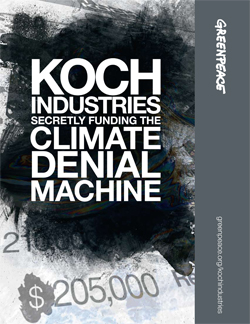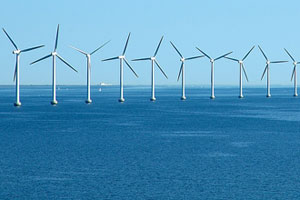
Who’s behind a multi-million dollar campaign to seed doubt about climate change? It’s not just Exxon and Chevron—it’s also Koch Industries, an oil and gas giant that most people have never heard of, according to a new report from Greenpeace. Koch’s extensive funding of anti-climate work makes it the “financial kingpin of climate science denial and clean energy opposition,” says Greenpeace.
The Kansas-based company and its affiliates and foundations spent almost $25 million on “organizations of the ‘climate denial machine'” between 2005 and 2008, according to the report. Koch Industries and the Koch family also spent $37.9 million between 2006 and 2009. “Although Koch intentionally stays out of the public eye, it is now playing a quiet but dominant role in a high-profile national policy debate on global warming,” the report concludes.
The company is led by brothers Charles G. Koch and David H. Koch, and is the second largest privately-held company in America. As I’ve reported previously, their estranged brother, William, is behind the efforts to block the Cape Wind offshore wind project in Massachusetts. Koch money comes through a lot of business interests – ranching, mining, oil refining, and producing paper products, fertilizer, and chemicals.
The report lists 35 organizations who have directly or indirectly received money from Koch Industries, affiliates, or Koch family foundations. They include the libertarian think-tank Cato Institute, which received a $1 million grant from the Kochs. Cato runs the climate-change-denial site GlobalWarming.org, and is suing the Environmental Protection Agency to block its finding that climate change threatens human health. The Koch family has also directed more than $5 million to Americans for Prosperity, which has campaigned against efforts to cut greenhouse gas emissions. They have also supported Citizens for a Sound Economy (which later merged with another group to form FreedomWorks).
The Koch PAC has given more than $10,000 to 21 lawmakers since 2004—four Democrats and 17 Republicans—which is more than any other oil-and-gas sector PAC, the report states. Topping the House recipients: Henry Cuellar (D-Texas) at $30,500, Eric Cantor (R-Va.) at $28,000, and Joe Barton (R-Texas) at $26,500. On the Senate side, Jim DeMint (R-SC) and Lisa Murkowsi (R-Alaska) both received $20,000 in Koch Funds, and Blanche Lincoln (D-Ark.) received $18,000.
Between the foundation-funded groups, lobbying, political action contributions, Koch Industries and the Koch brothers are “among the most formidable obstacles to advancing clean energy and climate policy in the U.S.,” Greenpeace states.
The report also looks at Koch’s role in the so-called “ClimateGate” scandal, in which emails between scientists were hacked and made public. There’s been little doubt that this and other recent attacks on climate science were a coordinated attack by well-organized and well-funded groups hoping to sow doubt about the validity of climate change. Greenpeace notes that “Twenty organizations, roughly half of the Koch-funded groups profiled in this report, have contributed to the “ClimateGate” echo chamber.” The groups have posted articles, hosted events, and landed their in-house skeptics on cable news. Cato, for example, recently boasted that its senior fellow, Pat Michaels, was “at the center of the ‘ClimateGate’ controversy” in their newsletter.
The Kochs have also supported efforts to undermine scientific findings that polar bears are threatened by climate change by funding a study by prominent climate deniers. One of the authors, Dr. Willie Soon, disclosed in the acknowledgments that his work “was partially supported by grants from the Charles G. Koch Charitable Foundation, American Petroleum Institute, and Exxon-Mobil Corporation.”
Koch downplayed its role in the climate denial industry, issuing a statement to Agence France-Presse claiming that the company works to “support open, science-based dialogue about climate change and the likely effects of proposed energy policies on the global economy.” A later statement claimed that Greenpeace “mischaracterizes” its efforts, which are meant to “advance economic freedom and market-based policy solutions to challenges faced by society” and create “more opportunity and prosperity for all.”
Check out the whole report, an excellent case study of the climate denial machine. (Also, I should note, you may see ads for the report on our website this week).









